

September 2018 Edition!
AIU News + Essay + Study tips + Education + Culture + Science + Technology + Art + Design + Body + Mind + Spirit + Environment + Human Rights + Cibersecurity + About AIU


AIU News + Essay + Study tips + Education + Culture + Science + Technology + Art + Design + Body + Mind + Spirit + Environment + Human Rights + Cibersecurity + About AIU
 July 30, 2018.
One of our graduates,
Djerandouba
Yotobumbeti,
wrote the book
“Global Health and
Issues in Disease
Prevention” and it
has been published
by the Editions
Universitaires
Europpeennes.
Abstract: “No
Development is possible in a country if population
health is not a prioroty.
It is for this reason that almost
all the leaders
of the world
attach great
importance
to the health
of their fellow
citizen. To
ensure better
health for
the population,
it’s not
only important
to set up well-equipped hospitals,
clinics and health centers with
highly qualified health professionals,
but it will be vital to
help the population to put in
place effective control of different
diseases whether they
are transmissible or not…”
Djerandouba Yotobumbeti
completed a Doctorate program
with a major in Public
Health at AIU.
July 30, 2018.
One of our graduates,
Djerandouba
Yotobumbeti,
wrote the book
“Global Health and
Issues in Disease
Prevention” and it
has been published
by the Editions
Universitaires
Europpeennes.
Abstract: “No
Development is possible in a country if population
health is not a prioroty.
It is for this reason that almost
all the leaders
of the world
attach great
importance
to the health
of their fellow
citizen. To
ensure better
health for
the population,
it’s not
only important
to set up well-equipped hospitals,
clinics and health centers with
highly qualified health professionals,
but it will be vital to
help the population to put in
place effective control of different
diseases whether they
are transmissible or not…”
Djerandouba Yotobumbeti
completed a Doctorate program
with a major in Public
Health at AIU.
 July 30, 2018. One of
our graduates, Dr. Nadir
Sidiqi, wrote the
book “WATER with
Four Perceptions:
Transparent, Blue,
Gray, and Green”.
Abstract: “The title of this
book is a very essential asset
to understand and appreciate.
Each color represents the
importance of vitality and quality
of water in the context of
human life and their relationship
to the nature of water. For
instance, transparent water
represents the spiritual value of
water. The blue water represents
the natural water that can be found in rivers,
lakes, reservoirs, and
oceans. Here, this blue
water is specifically
for all the designated
significant biological
processes of water
which takes place in the formation
of the human body and
water requirements throughout
the human life cycle. ...”
Dr. Nadir Sidiqi completed
a Doctor of Philosophy, PhD
program with a major in Agricultural
Science at AIU.
Nadir has a physical disability
and has overcome so
many obstacles in his life
because of that.
July 30, 2018. One of
our graduates, Dr. Nadir
Sidiqi, wrote the
book “WATER with
Four Perceptions:
Transparent, Blue,
Gray, and Green”.
Abstract: “The title of this
book is a very essential asset
to understand and appreciate.
Each color represents the
importance of vitality and quality
of water in the context of
human life and their relationship
to the nature of water. For
instance, transparent water
represents the spiritual value of
water. The blue water represents
the natural water that can be found in rivers,
lakes, reservoirs, and
oceans. Here, this blue
water is specifically
for all the designated
significant biological
processes of water
which takes place in the formation
of the human body and
water requirements throughout
the human life cycle. ...”
Dr. Nadir Sidiqi completed
a Doctor of Philosophy, PhD
program with a major in Agricultural
Science at AIU.
Nadir has a physical disability
and has overcome so
many obstacles in his life
because of that.
 August, 2018. This graduate
student completed the majority
of the requirements to
obtain honors, which included
a 4.0 GPA, published works,
recommendation from his
respective advisors, patent a
product, etc. Congratulations!
August, 2018. This graduate
student completed the majority
of the requirements to
obtain honors, which included
a 4.0 GPA, published works,
recommendation from his
respective advisors, patent a
product, etc. Congratulations!
 Call for Papers
We invite you to submit your
manuscript(s). All manuscripts
are reviewed by the Editorial
Board and qualified reviewers.
Decisions will be made as
rapidly as possible, and the
journal strives to return reviewers
comments to authors
within 4 weeks.
Following acceptance, a paper
will normally be published
in the next issue. Instruction
for authors and other details
are available on our website
www.academiapublishing.
org/journals/ajsr/. Submit
your manuscript(s) to article.
academia@gmail.com
Academia Journal of Scientific
Research welcomes the
submission of manuscripts
in: Agricultural Sciences · Applied
Biology · Biochemistry ·
Biological Sciences · Biophysics
· Cell Biology · Chemical
Engineering · Chemistry · Civil
Engineering · Communication
& IT · Computer Science
· Construction · Dentistry ·
Developmental Biology · Ecology
· Education · Endocrinology
· Energy · Engineering, All
Fields · Entomology · Environment
· Evolution · Fisheries
· Food & Food Technology ·
Genetics · Genomics · Geology
· Immunology · Infectious
Diseases · Marine Sciences ·
Marine Technology · Mathematics
· Medical Technology
· Medicine · Microbiology ·
Nanotechnology · Neuroscience
· Nuclear Engineering ·
Nutrition and Food Science
· Oceanography · Oncology
· Parasitology · Petroleum &
Gas · Pharmacology · Physics
· Physiology · Plant Biology ·
Population Biology · Robotics
· Signal Transduction ·
Solid State Technology · Space
Science · Zoology · Veterinary
Science · Toxicology · Statistics
The journal is covered by
CABI, CAB ABSTRACTS in
partnership with Thomson
Reuters ISI Web of Science.
Call for Papers
We invite you to submit your
manuscript(s). All manuscripts
are reviewed by the Editorial
Board and qualified reviewers.
Decisions will be made as
rapidly as possible, and the
journal strives to return reviewers
comments to authors
within 4 weeks.
Following acceptance, a paper
will normally be published
in the next issue. Instruction
for authors and other details
are available on our website
www.academiapublishing.
org/journals/ajsr/. Submit
your manuscript(s) to article.
academia@gmail.com
Academia Journal of Scientific
Research welcomes the
submission of manuscripts
in: Agricultural Sciences · Applied
Biology · Biochemistry ·
Biological Sciences · Biophysics
· Cell Biology · Chemical
Engineering · Chemistry · Civil
Engineering · Communication
& IT · Computer Science
· Construction · Dentistry ·
Developmental Biology · Ecology
· Education · Endocrinology
· Energy · Engineering, All
Fields · Entomology · Environment
· Evolution · Fisheries
· Food & Food Technology ·
Genetics · Genomics · Geology
· Immunology · Infectious
Diseases · Marine Sciences ·
Marine Technology · Mathematics
· Medical Technology
· Medicine · Microbiology ·
Nanotechnology · Neuroscience
· Nuclear Engineering ·
Nutrition and Food Science
· Oceanography · Oncology
· Parasitology · Petroleum &
Gas · Pharmacology · Physics
· Physiology · Plant Biology ·
Population Biology · Robotics
· Signal Transduction ·
Solid State Technology · Space
Science · Zoology · Veterinary
Science · Toxicology · Statistics
The journal is covered by
CABI, CAB ABSTRACTS in
partnership with Thomson
Reuters ISI Web of Science.
 July 30, 2018. One of our
graduates, Sivarajasingam
Mahendran, was invited to
present his doctoral thesis research
on the use of counselling
psychology in motivating
to improve the speaking skills
of nonnative adult speakers of
English at the 16th Asia TEFL
convention 2018 at Macau.
English language academics
from various countries around
the world converged in the
University of Macau to present
different
perspectives
in the teaching
and learning
of English.
Dr Siva
Mahendran
gave a poster
presentation and networked with many
English language academics
all over the world during the
convention who were very
interested to learn about a
unique way to teach, especially
working adults in the EFL/
ESL classrooms speaking skills
quite effectively to motivate
them to speak more fluently
and correctly within a short
time (in about 3 months).
They were shown the positive
results of the post tests
given to adult learners in the
3-month study as well as some
limitations in such a qualitative
study as would be expected.
The doctoral research
study was approved and done
with the guidance of Atlantic
International University’s
professional faculty, which
has since been published. The
use of counselling psychology
approaches mentioned in
the mostly qualitative study,
enhanced speaking skills quite
a bit and gave the EFL/ESL
nonnative adult speakers of
English (NNASE) added motivation
and practice to improve
their spoken English gradually
but in a non-threatening, nonjudgmental,
and empathically
conducive classroom environment.
The presentation stood
out among all the others as it
was seen as globally unique,
and perhaps the only one done
in the world to teach language
speaking skills using counselling
psychology approaches
to date; other than counselling
learning techniques, CLT,
used in addition or alternatively
to other methods and
approaches.
Sivarajasingam Mahendran
completed a Doctorate program
of Education at Atlantic
International University.
July 30, 2018. One of our
graduates, Sivarajasingam
Mahendran, was invited to
present his doctoral thesis research
on the use of counselling
psychology in motivating
to improve the speaking skills
of nonnative adult speakers of
English at the 16th Asia TEFL
convention 2018 at Macau.
English language academics
from various countries around
the world converged in the
University of Macau to present
different
perspectives
in the teaching
and learning
of English.
Dr Siva
Mahendran
gave a poster
presentation and networked with many
English language academics
all over the world during the
convention who were very
interested to learn about a
unique way to teach, especially
working adults in the EFL/
ESL classrooms speaking skills
quite effectively to motivate
them to speak more fluently
and correctly within a short
time (in about 3 months).
They were shown the positive
results of the post tests
given to adult learners in the
3-month study as well as some
limitations in such a qualitative
study as would be expected.
The doctoral research
study was approved and done
with the guidance of Atlantic
International University’s
professional faculty, which
has since been published. The
use of counselling psychology
approaches mentioned in
the mostly qualitative study,
enhanced speaking skills quite
a bit and gave the EFL/ESL
nonnative adult speakers of
English (NNASE) added motivation
and practice to improve
their spoken English gradually
but in a non-threatening, nonjudgmental,
and empathically
conducive classroom environment.
The presentation stood
out among all the others as it
was seen as globally unique,
and perhaps the only one done
in the world to teach language
speaking skills using counselling
psychology approaches
to date; other than counselling
learning techniques, CLT,
used in addition or alternatively
to other methods and
approaches.
Sivarajasingam Mahendran
completed a Doctorate program
of Education at Atlantic
International University.
 Call for Papers
This Conference will be held
1–3 March 2019 at Saint
Petersburg State University in
Saint Petersburg, Russia.
We invite proposals for paper
presentations, workshops/
interactive sessions, posters/
exhibits, colloquia, focused
discussions, innovation
showcases, virtual posters, or
virtual lightning talks.
Theme 1: Design Education
Theme 2: Design in Society
Theme 3: Designed Objects
Theme 4: Visual Design
Theme 5: Design Management
and Professional Practice
Theme 6: Architectonic,
Spatial, and Environmental
Design
2019 Special Focus:
Design + Context
Become a Presenter:
1. Submit a proposal
2. Review timeline
3. Register
Regular proposal
deadline
1 December 2018
Regular registration
deadline
1 February 2019
Visit the website:
http://designprinciplesandpractices.com
Call for Papers
This Conference will be held
1–3 March 2019 at Saint
Petersburg State University in
Saint Petersburg, Russia.
We invite proposals for paper
presentations, workshops/
interactive sessions, posters/
exhibits, colloquia, focused
discussions, innovation
showcases, virtual posters, or
virtual lightning talks.
Theme 1: Design Education
Theme 2: Design in Society
Theme 3: Designed Objects
Theme 4: Visual Design
Theme 5: Design Management
and Professional Practice
Theme 6: Architectonic,
Spatial, and Environmental
Design
2019 Special Focus:
Design + Context
Become a Presenter:
1. Submit a proposal
2. Review timeline
3. Register
Regular proposal
deadline
1 December 2018
Regular registration
deadline
1 February 2019
Visit the website:
http://designprinciplesandpractices.com

| Augusto Chipesse Doctor of Theology Ethics Angola |
Nelson Fernando Alberto Bachelor of Business Administration Business Management Angola |
Valdemiro Ângelo Matsinhe Master of Business Administration Project Management Angola |
Randy St Clair Baltimore Bachelor of Science Business Management Antigua and Barbuda |
Héctor José Garzón Giner Doctor of Public Safety Public Safety Argentina |
Abiyah Coretta Edango Epse Mimba Doctor of Business Administration Human Resources Cameroon |
| Racheal Agen Tegwi Master of Business Administration Business Administration Cameroon |
Juan Luis Rojas Rivas Doctor of Education Education Chile |
Leticia Elizabeth Monsalve Escorza Doctor of Education Education Innovation Chile |
Alejandro Gaitan Hurtado Doctor of Science Psychology Colombia |
German Alonso Millan Londoño Bachelor of Architecture Sustainable Architecture Colombia |
Blana Nivia Morales Contreras Doctor of Science Psychology Colombia |
| Sawadogo Simeon Doctor of Philosophy Public Health, Epidemiology and Biostatistics Democratic Rep ublic of Congo |
Carmen Mata De Salcedo Bachelor of Arts Art Education Dominican Rep ublic |
Carolin Bravo Muñoz Bachelor of Business Administration Business Dominican Rep ublic |
Quelvy Magadaleno Sosa Sosa Doctor of Linguistics Spanish Language Teaching Dominican Rep ublic |
Jenny Adelina Abreu G Bachelor of Science Psychology Dominican Rep ublic |
Ricardo Jose Rosa Ureña Master of Science Environmental Science Dominican Rep ublic |
| Guillermo Redman Salomon Bachelor of Science Civil Enginee ring Dominican Rep ublic |
Víctor Hugo Briones Kusactay Doctor of Philosophy Business Administration Ecuador |
Luis Daniel Muñoz Balarezo Bachelor of Science Industrial Enginee ring Ecuador |
Baltasar Nseng Mesian Abaga Doctor of Political Science Political Science Equatorial Guinea |
Levi Bueriberi Brigol Bachelor of Science Architecture Equatorial Guinea |
Héber Reynaldo Figueroa Martínez Bachelor of Science Agronomy Enginee ring Guatemala |
| Walter Estuardo Acevedo Martínez Bachelor of Science Agricultural Enginee ring Guatemala |
Diana Jeanneth Barrera Contreras Bachelor of Legal Science Legal Sciences Guatemala |
Nicolette Odella Henry Doctor of Philosophy Health Care Administration Guyana |
Sully Frantz Anglade Estalus Certificate of Science Computer Science Haiti |
Maria Manuela Torres Rojas Bachelor of Science Microbiology Honduras |
Gilda Albertina Eveline Hernandez Bachelor of Economics Economics Honduras |
| Janet Beatríz Pernett Baúzzan Bachelor of Education Education Japan |
P. Garswa Jackson Master of Accounting Accounting Liberia |
Hendricks Babinikiwe T. Mwenelupembe Master of Science Health Care Administration Malawi |
Alberto De Jesus Silva De La Mora Bachelor of Architecture Sustainable Architecture Mexico |
Luis Jaime Osorio Chong Master of Public Administration Public Policies Development Mexico |
Pascoal Roldão da Conceição Bachelor of Economics Business and Economics Mozambique |
| Joaquim João Guambe Bachelor of Science Occupational Health and Safety Mozambique |
Mahamidou Oukali Master of Science Civil Enginee ring Niger |
Nwibani Udochukwu Ugomma Master of Science Psychology Nigeria |
Samuel Bamiji Bachelor of Arts Business Economics Nigeria |
Samuel Sule Ajanson Bachelor of Science Public Health Nigeria |
Carlos Antonio Villarreal Pinto Bachelor of Science Early Childhood Psychology Panama |
| Roberto Fuentes Saldaña Doctor of Music Ethnomusicology Panama |
Rosa Iris Villarreal Caballero Doctor of Philosophy Linguistics Panama |
Jorge Alfredo Machuca Cerdán Bachelor of Science Physical Therapy Peru |
Henry Saavedra Paredes Doctor of Civil Enginee ring Transportation and Highways Peru |
Raul Calderon Hernandez Bachelor of Science Civil Enginee ring Peru |
Javier Pedro Flores Arocutipa Doctor of Philosophy Political Science Peru |
| Héctor Farfán Oliva Bachelor of Business Administration Business Administration Peru |
Mildred Waleska Rodríguez Vega Doctor of Science Health Sciences Puerto Rico |
Yeimeliz Figueroa Cotto Doctor of Psychology Counseling Psychology Puerto Rico |
Harry E. Archilla Trinidad Doctor of Philosophy Education Puerto Rico |
Douglas Armando Suárez Romero Post Doctorate of Science Telecommunications Russ ian Fede ration |
Lovetta Gbassay Conteh-Turay Bachelor of Business Administration Business Administration Sierra Leone |
| Mahesh Vipula Jayasinghe Doctor of Business Administration Business Administration Sri Lanka |
Thembisile Gladys Khumalo Doctor of Philosophy Public Health Swaziland |
Uğur Çelik Bachelor of Science Electronic and Communications Enginee ring Turkey |
Mustafa Turhan Bachelor of Science Electronic and Communications Enginee ring Turkey |
Emrah Derici Bachelor of Science Computer Enginee ring Turkey |
Cemile Aslı Üstünkaya Ass ociate of Arts Business Administration Turkey |
| Lony Titus Okello Master of Science Public Health Uganda |
Namugga Zahrah Kasujja Bachelor of Science Archive and Records Management Uganda |
Natalia Anisimova Bachelor of Education Education UA E |
Martin Ricardo Mejia Martinez Doctor of Philosophy Architecture USA |
Lamin N.T. Sonko Bachelor of Business Management Finance USA |
Abdoul Kader Makanera Master of Business Administration Economics USA |
| Alexandra Cristal Acevedo Medina Bachelor of Business Administration International Relations USA |
Elijah Abuoi Arok Doctor of Social and Human Studies Sociology USA |
David Alarcon Magne Bachelor of Science Civil Enginee ring USA |
Rosa Lilia Álvarez Sánchez Bachelor of Science Nutrition USA |
Claudia Del Pilar Ramirez Restrepo Master of Science Psychology USA |
Alaa A. El-Halwagy Master of Business Administration Business Administration USA |
| Msimuko Betty Master of Proje ct Management Project Management Zambia |
Jeannie Namonje Mushala Doctor of Business Administration Business Administration Zambia |
Leonard Mwansa Doctor of Business Administration Business Administration Zambia |
Shillah Mpenyu Bachelor of Science Development Studies Zimbabwe |
Yunike Masiyandima Doctor of Business Administration Business Administration Zimbabwe |
Toko Muodzi Bachelor of Science Nutrition Zimbabwe |
 Calvin Brutus
Calvin Brutus  Gilbert Chimese Kasongo
Gilbert Chimese Kasongo Nelson Alberto
Nelson Alberto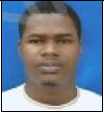 Samuel Bamiji
Samuel Bamiji
This is a widely used term
and can mean different to
everyone. Going Green simply
means taking steps to conserve
energy, reduce pollution
and save money.
Going green also means
to pursue knowledge and
practices that can lead to more
environmentally friendly
and ecologically responsible
decisions and lifestyles, which
can help protect the environment
and sustain its natural
resources for current and
future generations. Green living
is a lifestyle that tries in as
many ways as it can to bring
into balance the conservation
and preservation of the Earth's
natural resources, habitats,
and biodiversity with human
culture and communities.
More and more people are
thinking about the environmental
issues and ecological
condition of Earth nowadays.
Why has this problem become
so relevant? What should we
do to save our future? In my
opinion, people have understood
that their irresponsibility
causes harm to the natural
environment. Our planet suffers
from numerous problems,
which have been caused by
the results of the excessive
anthropogenic activity. The
entire planet suffers from
pollution, global warming,
deforestation, extinction of
biological species, etc. These problems are extremely relevant
and require rapid and
intensive solutions.
It is possible
to defeat these problems
if the entire humanity changes
its approach towards nature,
natural resources and the
value of nature for its wellbeing.
In simple words, people
should go green to save Earth.
Why should we take efforts
now in order to save Earth
in future? Very few people
understand that it is important
to change their lifestyle
now in order to see the results
of these changes in a few
decades. Doubtless, you will
not grow a big forest in a year.
You can plant a small tree but
it will grow to its proper height
only in ten or fifteen years. To
my mind, this activity resembles
investment into a small
firm. In a few years, the firm
develops into a big company,
which will provide you with
the solid profit. Consequently,
it is not right to say that the
idea of going green is useless.
When you do not see the
results of your activity now,
it does not mean that you will
not see them in ten years.
Furthermore, we must not
be selfish. It is important to
think about the wellbeing of
our children and grandchildren.
We are responsible for
the natural environment and
problems, which will become
the burden for our children.
I know that many people do
not care about the condition
of Earth after their death.
They say that it is the headache
of our future generations.
I suppose, it is the main
problem. People do not care
about future and they do not
appreciate what they have.
This approach is caused by
greediness and consumerism.
People want more money and
material values in order to
satisfy their needs. They are
ready to exhaust the world
they live in. They cut down
forests, kill animals, birds and
fish and pollute rivers, lakes,
seas and oceans. They care
about their profit and nothing
more. No wonder, people open
new and new plants, factories
and power stations, which
cause harm to the natural environment
but provide them
with money.
It looks ridiculous
when people are ready
to destroy forests and pollute
rivers in order to gain profit.
People do not appreciate fresh
air and water, though they
cannot survive a minute without
them. They are ready to
live in the unhealthy, terriblylooking
and polluted environment
in order to receive more
money. Finally, they will have
to pay for their treatment at a
hospital, because they breathe
in polluted air and consume
contaminated food and water.
How can we save our planet from the results of our harmful
activity? To begin with,
we should reduce pollution,
because it the cause of numerous
problems. We must not
litter in the street, parks and
forests. We should recycle
wastes in order to save our
priceless natural recourses.
We should use public transport
more frequently, because
it does not release numerous
harmful gases, which cause
greenhouse effect and global
warming. Next, entrepreneurs
should use special filters at
plants, factories and power
stations in order to reduce
the amount of poisonous
emissions into the air and
water. Then, people should
stop cutting down forests,
because they are the lungs of
Earth. Moreover, every forest
is a home for thousands of
animals, birds and insects,
which improve the balance of
ecosystems.
In conclusion, our unwise
and extensive activity
causes harm to the natural
environment. We lose priceless
natural resources, fresh
air, water, forests, animals,
birds, fish, insects, etc. People
should change their lifestyle
rapidly in order to stop deforestation,
global warming,
pollution and other problems,
which can destroy the life on
the planet. We ought to
go green in order to
save the life of future
generations.
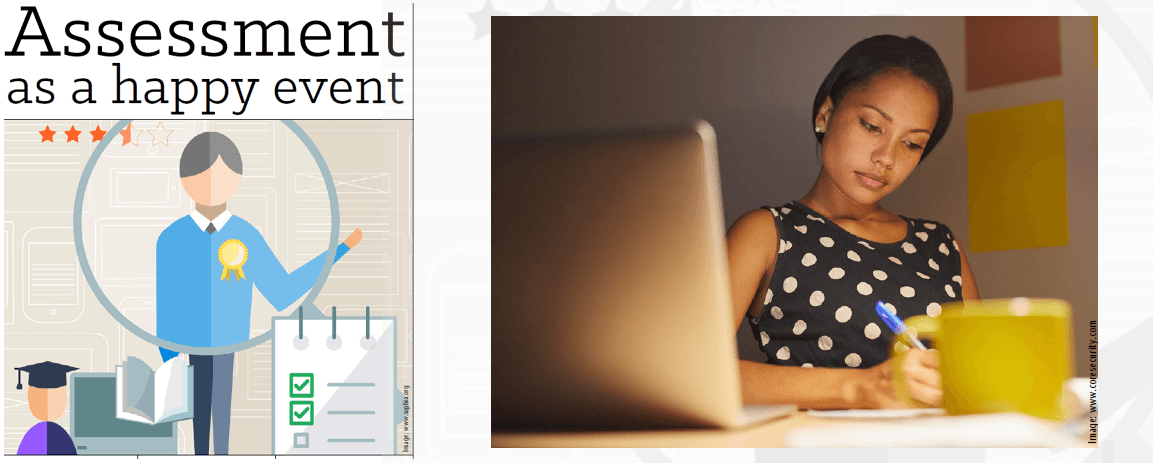
We are deeply happy
when we are accepted
at a university to complete the
study program of the career
we have chosen to transform
our lives into a path of greater
satisfaction than we have.
We are in the university,
they give us all the information
of how our curriculum will be,
we look for the resources that
we need in terms of books and elements, in terms of everything
we have to do.
We begin the first level and
when the time comes that we
have to demonstrate what we
have learned, when it comes
to the evaluation, oh god! All
happiness is over and anguish
begins.
What happens to the
evaluation that becomes both
teachers and students in the
difficulty to overcome in the
conflict they have to ward off?
For teachers and students
it is a fire test. What should
the evaluation be? What is
done wrong to make it the
least happy time for many
students? It is the same feeling
for many teachers.
First of all we must define
the evaluation to be able to
analyze what it must be and
the mistakes that are made by
both students and teachers.
Frida Díaz Barriga Arceo
and Geraldo Hernández Rojas
say in their work Teaching
Strategies for Meaningful
Learning that the evaluation
activity is related to the extent
and complexity of what the
students learn with the help of
the teacher.
The evaluation then implies
a curricular model and established
norms.
The Curricular model
includes the framework of
activities that characterize an
educational organization, such
as: Philosophy, Policies, The
Pedagogical Model and The
Administrative Organization.
Pedagogy linked to Psychology
will indicate how we are
going to do what is meant by
learning, in the case of the first,
and that of the second: in what
way do human beings do it.
The evaluation must be
based on conceptions of education,
society, subjects and
moral values.
We can consider the mediating
evaluation as a Psychopedagogical
proposal with
the following times: the one of
admiration of the apprentice,
the time of reflection that is
the moment in which the student
find oneself and the time
of evaluation that is the space
to see what to do, how do it to
meet the needs of the one who
is learning.
According to Vygosky,
(1991a, 1991b, 1993, 1995), and his
concept of "Near Development
Zone" where the human being
learns about his environment
by cultural agents. Cultural
agents are also the teachers who must establish challenges
to the potential of the
apprentice.
The concepts presented
establish clarity as to what the
evaluation should be, leaving
behind the practice of measurement
instruments for only
having safe or reliable results,
as they think, and reaching
the practice of some teachers
to put the exercises more difficult
for the time of the test,
the time of the assessment.
The evaluation as a process
of recognizing what the
student or apprentice does
must be independent of the
pedagogical model that can
be had but it happens that
the evaluative models that
become a castration for the
student what they indicate is
the vision that the teacher has
about his practice, the student
and society.
To evaluate, different
moments and innumerable
instruments have been
generated:
The Moments: Initial or
Diagnostic Evaluation, Formative
Evaluation and Summative
Evaluation.
The Instruments: Informal
Techniques, Semiformal Techniques,
Formal Techniques.
Formal Techniques include:
Test type, Concept maps,
Execution tests (essays) and
Checklists.
Therefore we have already
explained, it can be inferred
what is done wrong by teachers
and students so that the
evaluation is an unfortunate
event.
Teachers must be the link
between what the students
know and the new learning so
there must be adequate communication
about what the
students know and what need
guidance so that it becomes a
new learning.
The previous step implies
the recognition by the teacher
what he is in the learning process,
what the student is as a
human being and that society
to be a better place for all has
to be built by everyone, each
one with a fulfilled role.
In the evaluation the student
has to be the apprentice
who seeks to know instead of
passing; who questions where,
how, and how does he or she
present the best of himself or
herself?
At Atlantic International
University (AIU) both advisors
and students have the
opportunity, given the educational
model, of an evaluation
considered as a link; we
seek to develop the
potentialities of each
human being to build
a better society.
Students have the
opportunity to realize
the type of instrument
that they
consider to demonstrate
thier learning,
the communication
that they need and be
considered a human
being born to develop
their potentialities
and have a space in
the society.
Advisors have the
strength of the holistic
philosophy that
sustains the university
that considers
as a whole: the
development of the
human being and the
growth of the society
for the construction
of a world with opportunities
for all so
we can perform our
work being the links
between what the
students know and
the new learning that
they seek.
BIBLIOGRAPHY.
Anijovich, Rebeca y otros (2010). La Evaluación
Significativa, Argentina: Paidós. | Ausubel, D. y Joseph
Novak (2009). Psicología Educativa, México: Trillas. | Díaz Barriga
Arceo, F. y Geraldo Hernández Rojas (2010). Estrategias
docentes para un aprendizaje significativo, una interpretación
constructivista, México: Trillas. | Glazman N. Raquel (2010).
Evaluación y exclusión en la enseñanza universitaria. México:
Paidós Educador. | Nieto, J. (2011). Evaluación sin exámenes. Madrid:
editorial CCS. | Olave Arias, Giohanny y otros. (2014). Cómo
escribir la investigación académica. Desde el proyecto hasta la
defensa. México: Ediciones de la U.
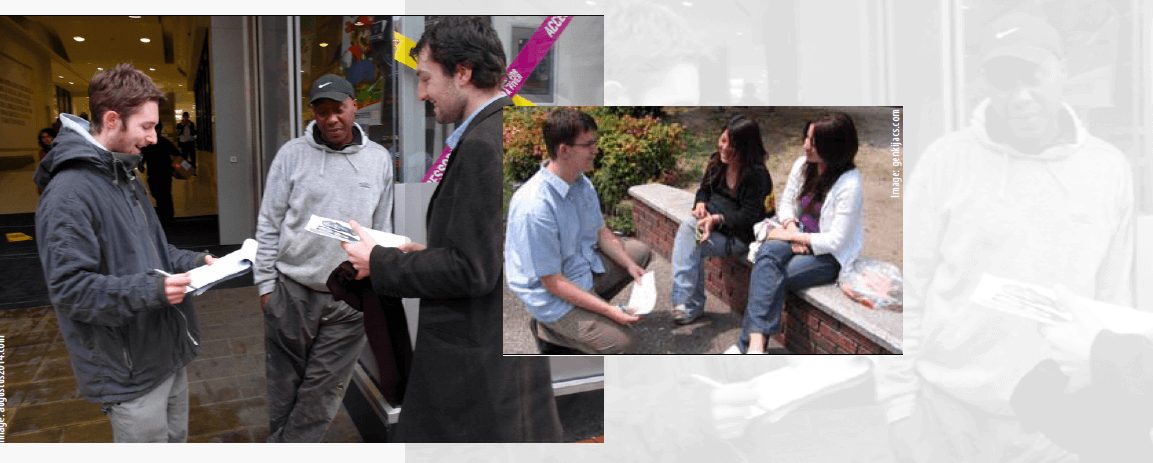
Did you ever create a questionnaire?
Why would
you ever create a questionnaire?
What is a questionnaire
anyway?
In your AIU courses, you
need to research subjects,
and then write an assignment
about your research. Well,
one way to do research is to
ask questions to people in
your community. Then you
write about what you learned
from the answers. You ask the
questions through a questionnaire,
which is a series of
questions. It can be printed
out on paper for each person,
or you just read the questions
to the people.
Once you have the answers,
then you can present the results
in your assignment. Here
are some questions to analyze
in your assignment?
• Were you surprised by the
answers?
• What answers were you expecting?
• What did you learn about
your community?
• What percentage of the
people agreed with your
point of view?
• Why did some people disagree
with your point of view?
• Were the questions in your
questionnaire sufficient to
understand the subject?
• What other questions would
you ask if you did the questionnaire
a second time?
At AIU, we have a course to
teach you how to prepare
and give a questionnaire. I
recommend this course to any
student who wants to research
the opinions or knowledge of
other people.
Whether you want
information from customers
to your business or reactions
to government programs, the
questionnaire is a wonderful
method of doing your
research. Basically, you just
think of 6 to 20 questions.
Prepare a paper to record the
answers. Then compile the responses.
You can even develop
some statistical methods to
analyze the data.
Doing a questionnaire is also
fun. You will talk with people.
You will have fun conversations.
It is always good to meet
people so that they can see you
are studying and developing
the interests of the community.
So do a questionnaire, have
fun and submit an assignment
about your experience.
 The I Promise School in Akron,
OH, funded and founded by
former resident and current NBA star
LeBron James via the LeBron James
Family Foundation along with Akron
City Schools, has a stated purpose of
serving low-income and at-risk kids
and focusing on Science, Technology,
Engineering, and Math (STEM).
It breaks a lot of ground with a focus
on the "whole child." From traumainformed
support systems to family
wraparound support, which helps
solve challenges in the home and with
the entire family including helping
parents find a job and even get a GED.
The school will make sure the kids are
adequately fed, which means the understanding
exists here that education
extends beyond time sitting in a classroom
desk and even beyond traditional
teacher-student relationships.
“We have a family resource center
housed on the premises of our school
because we're not only into nurturing
and loving our students, but we are
wrapping around our arms around the
entire family,” said Principal Brandi
Davis in an interview with NPR.
The children will attend for longer
days than most schools —roughly 9 a.m.
to 5 p.m.— and they will even get free
college tuition at the University of Akron
if they graduate from high school.
All students will get a free bike ...
The I Promise School in Akron,
OH, funded and founded by
former resident and current NBA star
LeBron James via the LeBron James
Family Foundation along with Akron
City Schools, has a stated purpose of
serving low-income and at-risk kids
and focusing on Science, Technology,
Engineering, and Math (STEM).
It breaks a lot of ground with a focus
on the "whole child." From traumainformed
support systems to family
wraparound support, which helps
solve challenges in the home and with
the entire family including helping
parents find a job and even get a GED.
The school will make sure the kids are
adequately fed, which means the understanding
exists here that education
extends beyond time sitting in a classroom
desk and even beyond traditional
teacher-student relationships.
“We have a family resource center
housed on the premises of our school
because we're not only into nurturing
and loving our students, but we are
wrapping around our arms around the
entire family,” said Principal Brandi
Davis in an interview with NPR.
The children will attend for longer
days than most schools —roughly 9 a.m.
to 5 p.m.— and they will even get free
college tuition at the University of Akron
if they graduate from high school.
All students will get a free bike ...
 Christoph Niemann's TED Talk excerpt:
“I'm an artist. Being an artist
is the greatest job there is. And I really
pity each and every one of you who has
to spend your days discovering new
galaxies or saving humanity from global
warming. But being an artist is also a
daunting job. I spend every day, from
nine to six, doing this (shows image).
“I even started a side career that
consists entirely of complaining about
the difficulty of the creative process. But
today, I don't want to talk about what
makes my life difficult. I want to talk
about what makes it easy. And that is
you and the fact that you are fluent in a
language that you're probably not even
aware of. You're fluent in the language
of reading images. Deciphering an image
like that takes quite a bit of an intellectual
effort. But nobody ever taught
you how this works, you just know it.
“College, shopping, music. What
makes a language powerful is that you
can take a very complex idea and communicate
it in a very simple, efficient
form. These images represent exactly
the same ideas. But when you look, for
example, at the college hat, you know
that this doesn't represent the accessory
you wear on your head when you're
being handed your diploma, but rather
the whole idea of college. ...
Watch TED Talk:
Christoph Niemann's TED Talk excerpt:
“I'm an artist. Being an artist
is the greatest job there is. And I really
pity each and every one of you who has
to spend your days discovering new
galaxies or saving humanity from global
warming. But being an artist is also a
daunting job. I spend every day, from
nine to six, doing this (shows image).
“I even started a side career that
consists entirely of complaining about
the difficulty of the creative process. But
today, I don't want to talk about what
makes my life difficult. I want to talk
about what makes it easy. And that is
you and the fact that you are fluent in a
language that you're probably not even
aware of. You're fluent in the language
of reading images. Deciphering an image
like that takes quite a bit of an intellectual
effort. But nobody ever taught
you how this works, you just know it.
“College, shopping, music. What
makes a language powerful is that you
can take a very complex idea and communicate
it in a very simple, efficient
form. These images represent exactly
the same ideas. But when you look, for
example, at the college hat, you know
that this doesn't represent the accessory
you wear on your head when you're
being handed your diploma, but rather
the whole idea of college. ...
Watch TED Talk:
 Scientists have discovered a “Big
Bang” of Alzheimer’s disease –
the precise point at which a healthy
protein becomes toxic but has not yet
formed deadly tangles in the brain.
A study from UT Southwestern’s
O’Donnell Brain Institute provides
novel insight into the shape-shifting
nature of a tau molecule just before it
begins sticking to itself to form larger
aggregates. The revelation offers a
new strategy to detect the devastating
disease before it takes hold and has
spawned an effort to develop treatments
that stabilize tau proteins before
they shift shape.
“This is perhaps the biggest finding
we have made to date, though it
will likely be some time before any
benefits materialize in the clinic. This
changes much of how we think about
the problem,” said Dr. Marc Diamond,
Director for UT Southwestern’s Center
for Alzheimer’s and Neurodegenerative
Diseases and a leading dementia
expert credited with determining that
tau acts like a prion –an infectious
protein that can self-replicate.
The study published in eLife contradicts
the previous belief that an isolated
tau protein has no distinct shape
and is only harmful after it begins to
assemble with other tau proteins to
form the distinct tangles seen in the
brains of Alzheimer’s patients.
Scientists made the discovery after
extracting tau proteins from human
brains and isolating them as single molecules.
They found that the harmful ...
Scientists have discovered a “Big
Bang” of Alzheimer’s disease –
the precise point at which a healthy
protein becomes toxic but has not yet
formed deadly tangles in the brain.
A study from UT Southwestern’s
O’Donnell Brain Institute provides
novel insight into the shape-shifting
nature of a tau molecule just before it
begins sticking to itself to form larger
aggregates. The revelation offers a
new strategy to detect the devastating
disease before it takes hold and has
spawned an effort to develop treatments
that stabilize tau proteins before
they shift shape.
“This is perhaps the biggest finding
we have made to date, though it
will likely be some time before any
benefits materialize in the clinic. This
changes much of how we think about
the problem,” said Dr. Marc Diamond,
Director for UT Southwestern’s Center
for Alzheimer’s and Neurodegenerative
Diseases and a leading dementia
expert credited with determining that
tau acts like a prion –an infectious
protein that can self-replicate.
The study published in eLife contradicts
the previous belief that an isolated
tau protein has no distinct shape
and is only harmful after it begins to
assemble with other tau proteins to
form the distinct tangles seen in the
brains of Alzheimer’s patients.
Scientists made the discovery after
extracting tau proteins from human
brains and isolating them as single molecules.
They found that the harmful ...
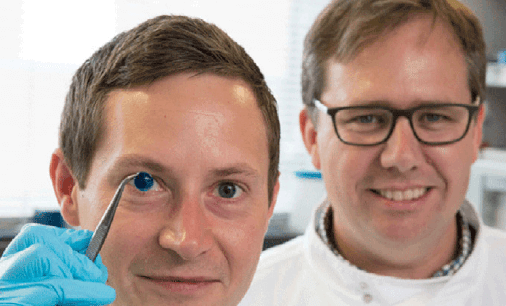 Scientists have produced the first
human corneas to be 3D-printed in
a lab, showing how we could potentially
generate this vital bit of anatomy
ourselves –and save millions of people
from blindness related to corneal damage
along the way.
The cornea, the membrane at the
front of the eye, is essential in helping
us focus properly, while also protecting
our eyes from the outside world. When
diseases like trachoma take hold, they
can be devastating to our vision.
As a result, human corneas are in
demand, with around 10 million people
worldwide waiting for a transplant
to help fix vision problems. Another 5
million people have gone completely
blind due to scarring of the cornea.
If we can produce usable corneas
in the laboratory, then many of these
people might be helped, something
that the researchers from Newcastle
University in the United Kingdom
explain has been the aim for many
scientists for a long time.
“Many teams across the world have
been chasing the ideal bio-ink to make
this process feasible,” says senior researcher
Che Connon.
“Now we have a ready to use bioink
containing stem cells allowing
users to start printing tissues without
having to worry about growing the
cells separately.” ...
Scientists have produced the first
human corneas to be 3D-printed in
a lab, showing how we could potentially
generate this vital bit of anatomy
ourselves –and save millions of people
from blindness related to corneal damage
along the way.
The cornea, the membrane at the
front of the eye, is essential in helping
us focus properly, while also protecting
our eyes from the outside world. When
diseases like trachoma take hold, they
can be devastating to our vision.
As a result, human corneas are in
demand, with around 10 million people
worldwide waiting for a transplant
to help fix vision problems. Another 5
million people have gone completely
blind due to scarring of the cornea.
If we can produce usable corneas
in the laboratory, then many of these
people might be helped, something
that the researchers from Newcastle
University in the United Kingdom
explain has been the aim for many
scientists for a long time.
“Many teams across the world have
been chasing the ideal bio-ink to make
this process feasible,” says senior researcher
Che Connon.
“Now we have a ready to use bioink
containing stem cells allowing
users to start printing tissues without
having to worry about growing the
cells separately.” ...
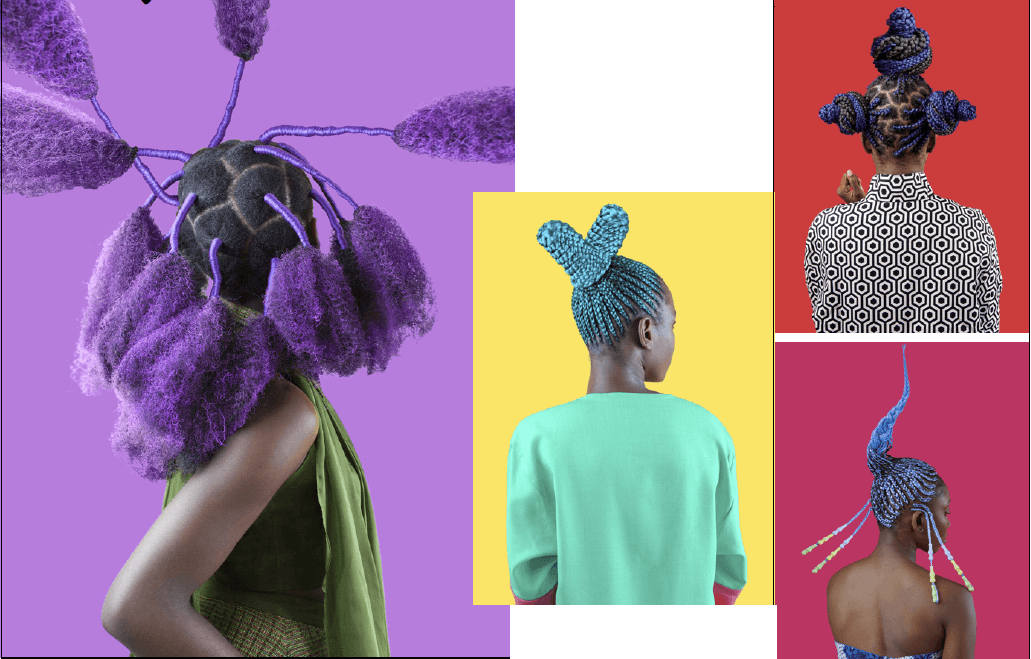
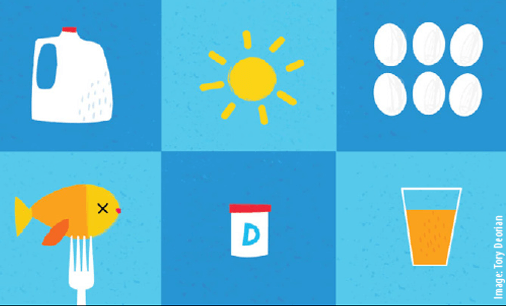 In its most extreme form, prolonged
and severe vitamin D deficiency
during childhood, known as rickets,
can delay growth and lead to visible
skeletal deformities. Today, rickets is
relatively rare, but that doesn’t mean
that vitamin D deficiency is —more
than 40 percent of Americans are
deficient. The potential health consequences
of this epidemic are serious,
as vitamin D deficiency is linked to
osteoporosis, heart disease, diabetes,
autoimmune diseases, high blood pressure,
and poor pregnancy outcomes.
It can sometimes be hard to tell
when you’re in need of more vitamin
D. Here are 15 signs that will help you
know if you’re vitamin D deficient.
1. Muscle Weakness
2. Bone Pain
3. Constant Respiratory Problems
4. Sweaty Head
5. Depression
6. Infertility
7. Chronic Infections
8. Cardiovascular Disease
9. Psoriasis
10. Chronic Pain
11. Tiredness
12. Hypertension
13. Crankiness
14. Chronic Kidney Disease
15. Reduced Endurance
Foods with higher concentrations of
vitamin D include fatty fish (tuna), orange
juice, soy milk, some cereals, beef
liver, egg yolks, dairy products that are
enriched with vitamin D.
In its most extreme form, prolonged
and severe vitamin D deficiency
during childhood, known as rickets,
can delay growth and lead to visible
skeletal deformities. Today, rickets is
relatively rare, but that doesn’t mean
that vitamin D deficiency is —more
than 40 percent of Americans are
deficient. The potential health consequences
of this epidemic are serious,
as vitamin D deficiency is linked to
osteoporosis, heart disease, diabetes,
autoimmune diseases, high blood pressure,
and poor pregnancy outcomes.
It can sometimes be hard to tell
when you’re in need of more vitamin
D. Here are 15 signs that will help you
know if you’re vitamin D deficient.
1. Muscle Weakness
2. Bone Pain
3. Constant Respiratory Problems
4. Sweaty Head
5. Depression
6. Infertility
7. Chronic Infections
8. Cardiovascular Disease
9. Psoriasis
10. Chronic Pain
11. Tiredness
12. Hypertension
13. Crankiness
14. Chronic Kidney Disease
15. Reduced Endurance
Foods with higher concentrations of
vitamin D include fatty fish (tuna), orange
juice, soy milk, some cereals, beef
liver, egg yolks, dairy products that are
enriched with vitamin D.
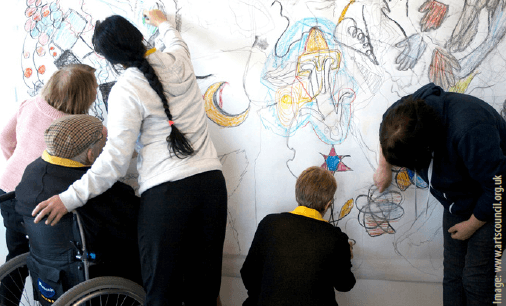 Perhaps many of us already well
know the formula for aging in
health and wellness. A balanced diet
and, as much as possible, one that’s
natural. Keep our brains active and
stimulated. Preserve and nurture
significant personal relationships, and
perhaps some other things besides.
But few might imagine that art could
also be a positive factor during this last
stage of the journey.
One study that provided ... evidence
of the relationship between creative
activities, aging and health was published
under the direction of Gene
D. Cohen, a gerontologist at George
Washington University. In the research,
Cohen tracked changes in three
groups of elderly New Yorkers with access
to artistic activities and compared
them with a control group. Among the
most noticeable results, he found that
one year into the study, the people who
steadily received the stimulus from
artistic disciplines during that time had
lower degrees of mental degeneration
when compared with individuals in the
control group.
According to Dr. Cohen this is because
creativity challenges the mind.
This results in the formation of new
dendrites and therefore new avenues
of communication within the brain. ...
Read full text:
Perhaps many of us already well
know the formula for aging in
health and wellness. A balanced diet
and, as much as possible, one that’s
natural. Keep our brains active and
stimulated. Preserve and nurture
significant personal relationships, and
perhaps some other things besides.
But few might imagine that art could
also be a positive factor during this last
stage of the journey.
One study that provided ... evidence
of the relationship between creative
activities, aging and health was published
under the direction of Gene
D. Cohen, a gerontologist at George
Washington University. In the research,
Cohen tracked changes in three
groups of elderly New Yorkers with access
to artistic activities and compared
them with a control group. Among the
most noticeable results, he found that
one year into the study, the people who
steadily received the stimulus from
artistic disciplines during that time had
lower degrees of mental degeneration
when compared with individuals in the
control group.
According to Dr. Cohen this is because
creativity challenges the mind.
This results in the formation of new
dendrites and therefore new avenues
of communication within the brain. ...
Read full text:
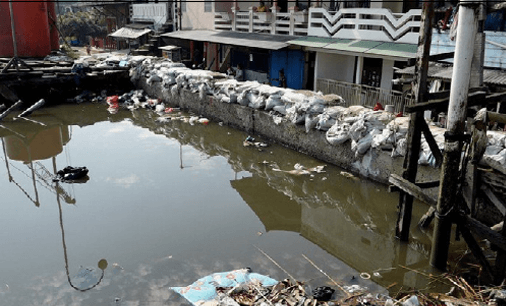
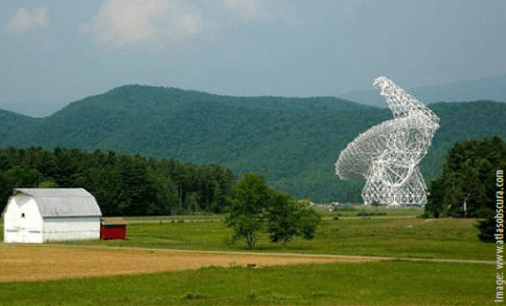 In this tiny town —population 143
(latest census)— wireless signals are
illegal. No cell phones. No WiFi. No
Bluetooth. No electronic transmitters
at all. The remote town is smack in
the center of the National Radio Quiet
Zone, a 13,000 square mile stretch of
land designated by the FCC to protect
two government radio telescopes from
man-made interference. The rules,
though, are most strict in Green Bank’s
neck of the woods. So strict, actually,
that someone roves the streets listening
for verboten wireless signals.
The town is home to the Green Bank
Telescope, the largest steerable radio
telescope in the world —and arguably
our most powerful link to the cosmos.
Scientists there listen to radio energy
that has journeyed light years, unlocking
secrets about how the stars and
galaxies formed. A rogue radio signal
could prevent potential discoveries,
discoveries that could answer big questions
about how the universe ticks.
But the status quo suits others well
–there is a small but significant population
of “electro-sensitive refugees”
who have moved into the area.
“We can't be where crowds of people
are –we have to stay away from people
because most people are carrying cell
phones and that harms us,” says Diane
Schou who calls herself a “technological
leper”. ...
In this tiny town —population 143
(latest census)— wireless signals are
illegal. No cell phones. No WiFi. No
Bluetooth. No electronic transmitters
at all. The remote town is smack in
the center of the National Radio Quiet
Zone, a 13,000 square mile stretch of
land designated by the FCC to protect
two government radio telescopes from
man-made interference. The rules,
though, are most strict in Green Bank’s
neck of the woods. So strict, actually,
that someone roves the streets listening
for verboten wireless signals.
The town is home to the Green Bank
Telescope, the largest steerable radio
telescope in the world —and arguably
our most powerful link to the cosmos.
Scientists there listen to radio energy
that has journeyed light years, unlocking
secrets about how the stars and
galaxies formed. A rogue radio signal
could prevent potential discoveries,
discoveries that could answer big questions
about how the universe ticks.
But the status quo suits others well
–there is a small but significant population
of “electro-sensitive refugees”
who have moved into the area.
“We can't be where crowds of people
are –we have to stay away from people
because most people are carrying cell
phones and that harms us,” says Diane
Schou who calls herself a “technological
leper”. ...
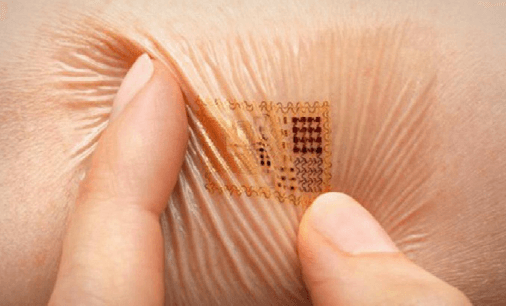 For some high-risk patients hospital
monitoring technology can be
life-saving. Yet, that same technology
can also be cumbersome and uncomfortable,
to say nothing of the excruciating
bill that arrives later. Patients
who choose to stay home, however,
risk having nothing but a phone with
which to ensure immediate attention,
should it become warranted, is
not really a good option. Now, thanks
to a group of scientists, spearheaded
by Todd Coleman, a third option is
available. This third option is no bigger
than a finger, bendable and based on
similar technology as that found in
electronic chips. Skin-applicable, this
“tattoo is no thicker than a human hair
follicle. Yet, it keeps track of the same
data as those, impressive, yet cumbersome,
hospital machines. Nor does it
require adhesive, because the adhesive
is part of the data-collecting patch
itself. Because of its small size and
ease of use, the patient can go on with
his, or her, life, outside of the hospital.
Wireless transmitting ensures that the
patient’s medical data is gathered, so
that Intervention can be accomplished
in a timely fashion, if needed. Legitimate
concerns about data-streaming
costs and privacy can be addressed by
creating a patient intermediary, such
as a nurse/coach.
Source: www.healthstatus.com
For some high-risk patients hospital
monitoring technology can be
life-saving. Yet, that same technology
can also be cumbersome and uncomfortable,
to say nothing of the excruciating
bill that arrives later. Patients
who choose to stay home, however,
risk having nothing but a phone with
which to ensure immediate attention,
should it become warranted, is
not really a good option. Now, thanks
to a group of scientists, spearheaded
by Todd Coleman, a third option is
available. This third option is no bigger
than a finger, bendable and based on
similar technology as that found in
electronic chips. Skin-applicable, this
“tattoo is no thicker than a human hair
follicle. Yet, it keeps track of the same
data as those, impressive, yet cumbersome,
hospital machines. Nor does it
require adhesive, because the adhesive
is part of the data-collecting patch
itself. Because of its small size and
ease of use, the patient can go on with
his, or her, life, outside of the hospital.
Wireless transmitting ensures that the
patient’s medical data is gathered, so
that Intervention can be accomplished
in a timely fashion, if needed. Legitimate
concerns about data-streaming
costs and privacy can be addressed by
creating a patient intermediary, such
as a nurse/coach.
Source: www.healthstatus.com
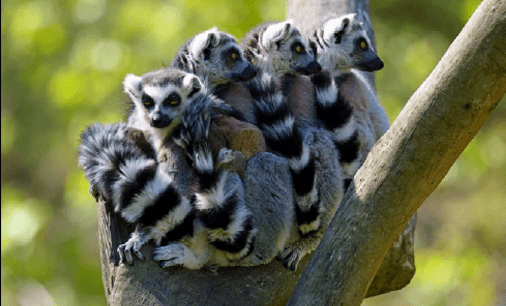 There are 111 species and subspecies
of lemur, and those are just
the ones we know about. Right now,
105 of those lemurs are under threat of
extinction.
This is the conclusion of the "Primate
Specialist Group", an international
group of experts convened by the
International Union for the Conservation
of Nature (IUCN), the BBC reports.
If their findings hold up under peer
review, it would make lemurs the most
endangered primates on the planet.
It would also suggest nothing much
has changed since a 2012 assessment,
which ranked lemurs as the most endangered
group of vertebrates, period.
Despite being an incredibly diverse
group, lemurs inhabit just one island
–Madagascar. While this makes for a very impressive wildlife scene, their
relatively small range puts them at
added risk of extinction when faced
with threats such as illegal logging,
slash-and-burn agriculture, mining,
and charcoal production, all of which
are destroying their environment.
Then there's the poaching. Christoph
Schwitzer, the chief zoological
officer at the Bristol Zoological Society,
told the BBC, a trend for unsustainable
lemur poaching is on the rise. Not only
is this encouraged by the exotic pet
trade but a taste for bushmeat, which
extends all the way up to the commercial
level. ...
There are 111 species and subspecies
of lemur, and those are just
the ones we know about. Right now,
105 of those lemurs are under threat of
extinction.
This is the conclusion of the "Primate
Specialist Group", an international
group of experts convened by the
International Union for the Conservation
of Nature (IUCN), the BBC reports.
If their findings hold up under peer
review, it would make lemurs the most
endangered primates on the planet.
It would also suggest nothing much
has changed since a 2012 assessment,
which ranked lemurs as the most endangered
group of vertebrates, period.
Despite being an incredibly diverse
group, lemurs inhabit just one island
–Madagascar. While this makes for a very impressive wildlife scene, their
relatively small range puts them at
added risk of extinction when faced
with threats such as illegal logging,
slash-and-burn agriculture, mining,
and charcoal production, all of which
are destroying their environment.
Then there's the poaching. Christoph
Schwitzer, the chief zoological
officer at the Bristol Zoological Society,
told the BBC, a trend for unsustainable
lemur poaching is on the rise. Not only
is this encouraged by the exotic pet
trade but a taste for bushmeat, which
extends all the way up to the commercial
level. ...
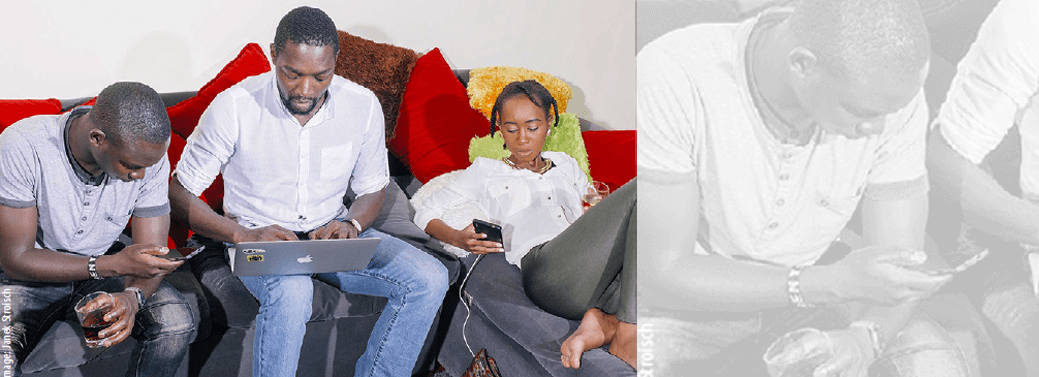
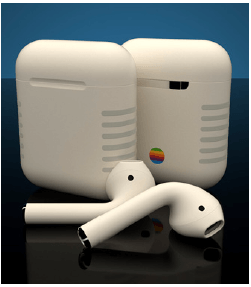 What’s old is new
again. Inspired by the Apple IIe, but
with the sleekness and convenance of
the current Apple AirPods.
What’s old is new
again. Inspired by the Apple IIe, but
with the sleekness and convenance of
the current Apple AirPods.
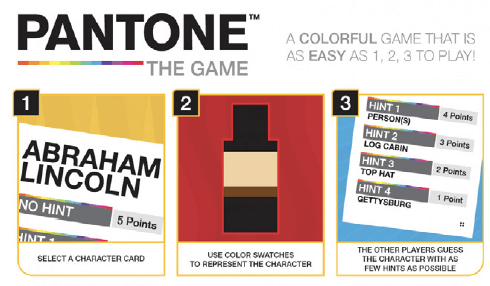 The game. Easy-to-learn competitive party game. The player,
who is currently the Artist, chooses a Character Card and then designs a representation
of that Character using only color Swatch Cards (in 15 different colors).
www.amazon.com
The game. Easy-to-learn competitive party game. The player,
who is currently the Artist, chooses a Character Card and then designs a representation
of that Character using only color Swatch Cards (in 15 different colors).
www.amazon.com
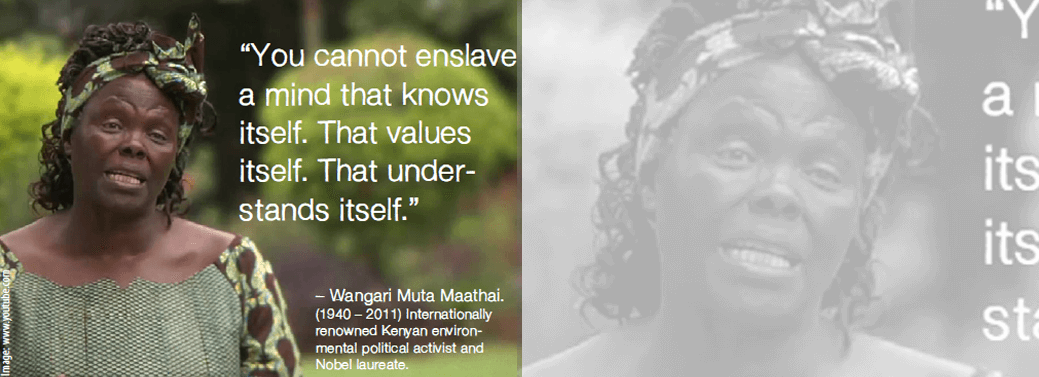
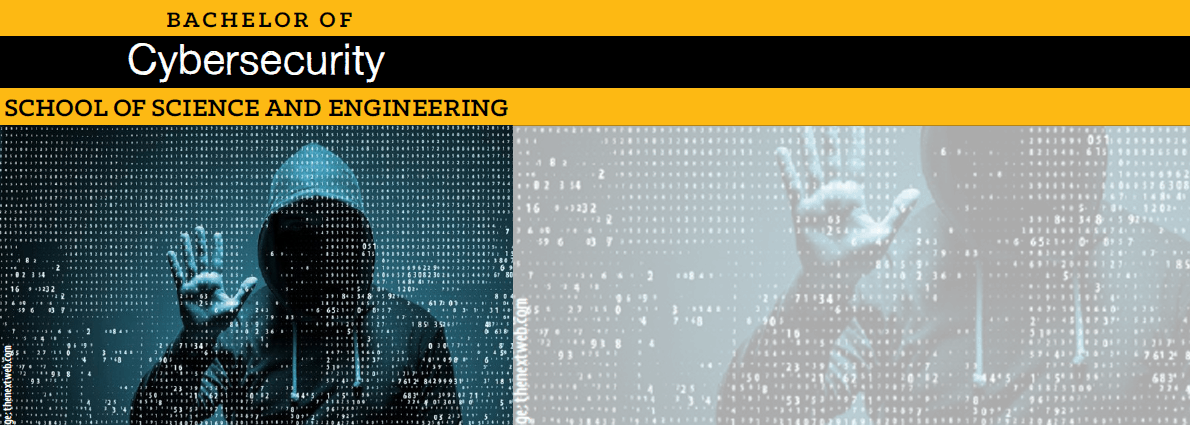 The Bachelor of Cybersecurity
(BS) program helps students build
credentials in the field of computer
security and to obtain knowledge
essential to the field. The emphasis
will be on analyzing security policies
and evaluating risk assessment
techniques. Bachelor of Cybersecurity
(BS) program is offered online via
distance learning. After evaluating
both academic record and life experience,
AIU staff working in conjunction
with Faculty and Academic Advisors
will assist students in setting up a
custom-made program, designed on
an individual basis. This flexibility to
meet student needs is seldom found
in other distance learning programs.
Our online program does not require
all students to take the same subjects/
courses, use the same books, or
learning materials. Instead, the online
Bachelor of Cybersecurity (BS) curriculum
is designed individually by
the student and academic advisor. It
specifically addresses strengths and
weaknesses with respect to market
opportunities in the student’s major
and intended field of work. Understanding
that industry and geographic
factors should influence the content
of the curriculum instead of a
standardized one-fits-all design is the
hallmark of AIU’s unique approach
to adult education. This philosophy
addresses the dynamic and constantly
changing environment of working
professionals by helping adult students
in reaching their professional
and personal goals within the scope of
the degree program.
The Bachelor of Cybersecurity
(BS) program helps students build
credentials in the field of computer
security and to obtain knowledge
essential to the field. The emphasis
will be on analyzing security policies
and evaluating risk assessment
techniques. Bachelor of Cybersecurity
(BS) program is offered online via
distance learning. After evaluating
both academic record and life experience,
AIU staff working in conjunction
with Faculty and Academic Advisors
will assist students in setting up a
custom-made program, designed on
an individual basis. This flexibility to
meet student needs is seldom found
in other distance learning programs.
Our online program does not require
all students to take the same subjects/
courses, use the same books, or
learning materials. Instead, the online
Bachelor of Cybersecurity (BS) curriculum
is designed individually by
the student and academic advisor. It
specifically addresses strengths and
weaknesses with respect to market
opportunities in the student’s major
and intended field of work. Understanding
that industry and geographic
factors should influence the content
of the curriculum instead of a
standardized one-fits-all design is the
hallmark of AIU’s unique approach
to adult education. This philosophy
addresses the dynamic and constantly
changing environment of working
professionals by helping adult students
in reaching their professional
and personal goals within the scope of
the degree program.
 Atlantic International University is accredited by the Accreditation Service for International
Schools, Colleges and Universities (ASIC). ASIC Accreditation is an internationally
renowned quality standard for colleges and universities. Visit ASIC’s Directory of Accredited
Colleges and Universities. ASIC is a member of CHEA International Quality Group (CIQG) in
the USA, an approved accreditation body by the Ministerial Department of the Home Office in the UK,
and is listed in the International Directory of the Council for Higher Education Accreditation (CHEA).
AIU meets all state and federal laws as a degree-granting institution in the United States and the State of
Hawaii. The University was legally established by corporate charter in 1998 and is in good standing.
Atlantic International University is accredited by the Accreditation Service for International
Schools, Colleges and Universities (ASIC). ASIC Accreditation is an internationally
renowned quality standard for colleges and universities. Visit ASIC’s Directory of Accredited
Colleges and Universities. ASIC is a member of CHEA International Quality Group (CIQG) in
the USA, an approved accreditation body by the Ministerial Department of the Home Office in the UK,
and is listed in the International Directory of the Council for Higher Education Accreditation (CHEA).
AIU meets all state and federal laws as a degree-granting institution in the United States and the State of
Hawaii. The University was legally established by corporate charter in 1998 and is in good standing.
 If a student outside the U.S. wishes to carry
out a particular procedure within a country’s
Department of Education regarding their
degree earned at AIU, such procedures are to
be carried out independently by the student.
AIU respects the unique rules and regulations
of each country and does not intervene or
influence the respective authorities. We
recommend prospective students who
intend to carry out such procedures
outside the U.S. to verify in detail the
steps and requirements needed in
order to be fully informed.
If a student outside the U.S. wishes to carry
out a particular procedure within a country’s
Department of Education regarding their
degree earned at AIU, such procedures are to
be carried out independently by the student.
AIU respects the unique rules and regulations
of each country and does not intervene or
influence the respective authorities. We
recommend prospective students who
intend to carry out such procedures
outside the U.S. to verify in detail the
steps and requirements needed in
order to be fully informed.
 The School of Business and Economics
allows aspiring and practicing
professionals, managers, and entrepreneurs
in the private and public sectors
to complete a self paced distance
learning degree program of the highest
academic standard.
The ultimate goal is to empower
learners and help them take advantage
of the enormous array of resources
from the world environment in order
to eliminate the current continuum of
poverty and limitations.
Degree programs are designed for
those students whose professional experience has been in business,
marketing, administration, economics,
finance and management.
The School of Business and Economics
allows aspiring and practicing
professionals, managers, and entrepreneurs
in the private and public sectors
to complete a self paced distance
learning degree program of the highest
academic standard.
The ultimate goal is to empower
learners and help them take advantage
of the enormous array of resources
from the world environment in order
to eliminate the current continuum of
poverty and limitations.
Degree programs are designed for
those students whose professional experience has been in business,
marketing, administration, economics,
finance and management.
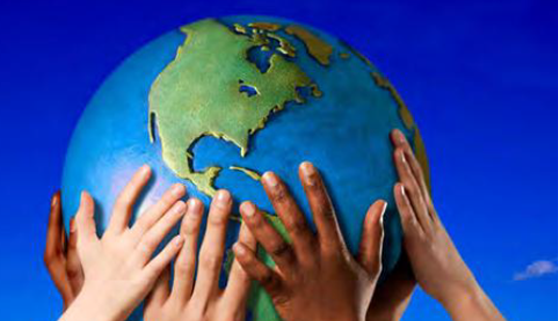 The School of Social and Human Studies
is focused on to the development of
studies which instill a core commitment
to building a society based on social and
economic justice and enhancing opportunities
for human well being.
The founding principles lie on the
basic right of education as outlined
in the Declaration of Human Rights.
We instill in our students a sense of
confidence and self reliance in their
ability to access the vast opportunities
available through information channels,
the world wide web, private, public,
nonprofit, and nongovernmental organizations in an ever expanding
global community.
Degree programs are aimed towards
those whose professional life has been
related to social and human behavior,
with the arts, or with cultural studies.
The School of Social and Human Studies
is focused on to the development of
studies which instill a core commitment
to building a society based on social and
economic justice and enhancing opportunities
for human well being.
The founding principles lie on the
basic right of education as outlined
in the Declaration of Human Rights.
We instill in our students a sense of
confidence and self reliance in their
ability to access the vast opportunities
available through information channels,
the world wide web, private, public,
nonprofit, and nongovernmental organizations in an ever expanding
global community.
Degree programs are aimed towards
those whose professional life has been
related to social and human behavior,
with the arts, or with cultural studies.
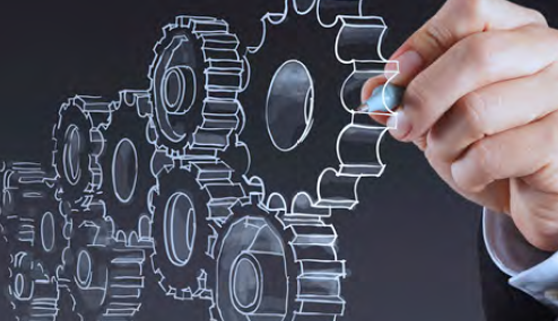 The School of Science and Engineering
seeks to provide dynamic, integrated,
and challenging degree programs
designed for those whose experience
is in industrial research, scientific production,
engineering and the general
sciences. Our system for research and
education will keep us apace with the
twenty-first century reach scientific
advance in an environmentally and
ecologically responsible manner to allow
for the sustainability of the human
population. We will foster among our
students a demand for ethical behavior,
an appreciation for diversity, an understanding
of scientific investigation,
The School of Science and Engineering
seeks to provide dynamic, integrated,
and challenging degree programs
designed for those whose experience
is in industrial research, scientific production,
engineering and the general
sciences. Our system for research and
education will keep us apace with the
twenty-first century reach scientific
advance in an environmentally and
ecologically responsible manner to allow
for the sustainability of the human
population. We will foster among our
students a demand for ethical behavior,
an appreciation for diversity, an understanding
of scientific investigation,
 With access to a global catalog created and maintained collectively by more than
9,000 participating institutions, AIU students have secured excellent research
tools for their study programs.
With access to a global catalog created and maintained collectively by more than
9,000 participating institutions, AIU students have secured excellent research
tools for their study programs.